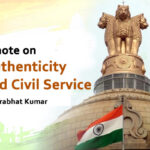The import of political interference – a point of view
In any discussion on the state of Indian civil services, the argument of politicians creating an environment of unprincipled governance is invariably raised. The civil servant is painted as a victim of the disreputable shenanigans of ministers and other political players. Cases of questionable demands of political bosses are recounted and it is argued that but for the unwanted pressure of these bosses, the civil servant would have treaded the straight path. She is shown as an unwitting (unsuspecting, involuntary) casualty in the terrible game of power politics.
The self styled heroes of civil services do not tire of telling the young officers how they withstood the political pressure and refused to obey the commands of the chief ministers or ministers. Though I am not in the habit of blowing my trumpet, I have also used stories of my defying (Challenging, disregarding, confronting) the explicit orders of a chief minister and disobeying the instructions of the President of India to prove my point in speeches on the Ethics of Public Service. However, to say that these stray incidents have influenced my way of thinking or shaped my career would be ludicrous, if not absurd.
However, the issue to be debated is the extent of significance (implication, consequence) of political interference in the entire working career of an average civil servant. In other words, does political pressure forces a young IAS officer to give up the right path or to align herself with a political party or a political leader. For illustration, let us consider a typical IAS officer in one of the notoriously corrupt states of the country. I have seen upright IAS officers being pressurized to do patently wrong acts by the Chief Ministers/ministers of my state. I have seen most of the officers resisting the pressure and succeeding or being penalized. In most cases the price paid by an honest officer is being transferred. I was transferred for not obeying the specific orders of the CM, but was not severely punished. In rare cases (like Balvinder Kumar’s and Durga Shakti’s cases) the officer is victimized and placed under suspension for a short period. This does demoralizes the officer temporarily. But whether such an episode breaks her idealistic drift and changes her character is debatable.
In some cases, the service loses a good officer to the machinations of the unscrupulous politicians and she becomes their active collaborator. It is definitely a fall out of the parliamentary politico-bureaucratic system, but in my view the politician cannot be held solely responsible for it. The civil servant is also equally responsible. There are several cases of IAS officers brazenly joining their political masters and enjoying coveted positions besides reaping monetary benefits. The story of two IAS officers of my state who despite being ‘elected’ as the most corrupt rose to the highest administrative level is well known. The catharsis of their going to jail is also equally well known.
In my view, a typical IAS officer would face the offensive politician demanding something unethical, immoral or illegal a couple of times in his entire career. In my 38 years in the IAS, I had to contend with the unprincipled politician half a dozen times. And in each case, I managed to escape without much damage due mainly to luck or may be because I was right.
In each case, the choice was mine. I could have yielded to the demands of the politician. And I believe that in case of every civil servant, the choice is entirely hers whether to give in to temptation or to keep her head straight. In either case, she should be willing to pay the price.
But for those half a dozen times, I had no acrimony with the politicians. In fact, most of the political bosses from the Prime Ministers to the junior ministers were polite to me. None of them asked for any personal favour from me in my official capacity. And even if a unreasonable desire was expressed, it was withdrawn when explained on the basis of laws and rules. The formal relationship was without rancor or bitterness.
I have no hesitation in admitting that there are wicked and overbearing politicians who want to have their way by hook or crook. I also admit that it is extremely difficult to work with them. And it could happen with a bureaucrat boss as well. How to deal with them is a separate subject. Here, it would be sufficient to say that adhering to the laws and rules is the best defence against a difficult and corrupt boss. Tact and diplomacy are added qualities that help in coping with unpleasant situations.
(I might hasten to add that I totally lack these much desired qualities of tactfulness and diplomacy, which has repeatedly caused frontal confrontations and my threats of resignation from service. It is sheer luck and the support from unknown quarters that I could complete my innings in the IAS and that too, not very badly. Once, I went to the extent of telling the Chief Minister that I suspected the minister in charge of my department to be corrupt. Fortunately, I got away without a scratch; perhaps because he was actually corrupt and the Chief Minister was not. The story is told elsewhere. Based on my personal experiences, it is my belief that if you have the courage of your convictions, you can afford to be audacious.)
The short point I want to make is that the impact of political pressure has been exaggerated in the context of the ethical conduct of a typical civil servant. There could, however, be a rare exception when a wicked politician might have spoiled the career of an upright civil servant. But by and large, the extent to which the politicians are shown as masters of the fate of civil servants is highly overestimated.
Prabhat Kumar


